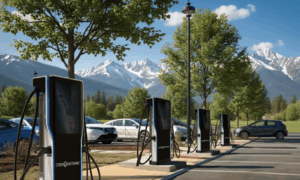
Home / EV Charging News / Assessing the Reliability of Solar Panels for EV Charging
As electric vehicles (EVs) become increasingly popular, many EV owners are exploring sustainable and cost-effective ways to power their vehicles. One promising solution is using solar panels to charge EVs. Solar energy offers the potential for significant savings and environmental benefits, but how reliable is it for this application? This article assesses the reliability of solar panels for EV charging, highlighting the benefits, challenges, and practical considerations for integrating solar energy into your EV charging setup.
Solar panels can provide a renewable and virtually limitless source of energy for EV charging, offering several key benefits.
While the benefits of solar panels are substantial, there are also several challenges to consider when using them for EV charging.
For those considering solar panels for EV charging, it’s essential to evaluate both the technical and financial aspects of the installation.
Solar panels offer a reliable and sustainable solution for charging electric vehicles, providing significant cost savings, environmental benefits, and energy independence. However, the reliability of solar panels for EV charging depends on careful planning and consideration of various factors, including initial costs, weather dependency, and energy storage needs. By properly sizing the system, integrating it with existing infrastructure, and taking advantage of financial incentives, EV owners can maximize the benefits of solar energy and contribute to a greener future. As technology advances and costs continue to decrease, solar-powered EV charging will likely become an increasingly viable and popular option for sustainable transportation.



